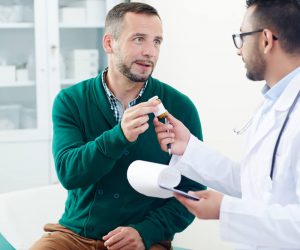3 Steps to Prevent Opioid Misuse

Preventing Opioid Misuse and Addiction
Opioid abuse, misuse, and addiction are prevalent issues across the nation and are at epidemic proportions. The key to tackling this widespread issue is to prevent opioid misuse before it begins. Taking the proper steps to avoid opioid misuse can help prevent a problem before it happens.
Three steps to take that can help prevent opioid misuse are:
- Speak with your children about the dangers and repercussions of abusing opioids.
- Talk to your doctor about possible alternatives to prescription opioids.
- Monitor your prescriptions medications to ensure you are taking them as prescribed.
Prescription Opioid Abuse in America
The over-prescription of opioids in the U.S. is jaw-dropping, with almost two million citizens abusing these potent painkillers in 2013; quadruple the amount in 2009. Over 7,000 individuals in the nation are rushed to the emergency room due to an opioid-related incident.
In 2019, close to 50,000 individuals in the U.S. died as a result of an opioid-related overdose. Nearly 29 percent of those prescribed opioids will misuse them, and 12 percent of those using opioids will develop an opioid use disorder (OUD). The opioid crisis is at mass proportions and is taking a massive economic and social toll.
By making access to treatment for opioid addiction easier and educating the population on the opioid epidemic facing the U.S., individuals can make more moral decisions regarding misusing prescription drugs.
The Importance of Preventing Opioid Abuse and Addiction Before They Occur
The importance of preventing opioid abuse before it begins cannot be understated, as opioid use and abuse will inevitably turn into addiction without the proper help and prevention plan in place. Some of the ways in which you can prevent opioid abuse and addiction before it becomes a significant problem are:
- Create a pain management plan and timeline with your doctor and schedule regular follow-ups.
- Always take opioids as directed by your doctor and never take more than the suggested dose.
- Know your options if you do discover that your opioid use is becoming a problem.
How Opioid Addiction Develops
Addiction can develop from several factors such as genetics, hereditary, peer pressure, and environmental factors, among others. It’s important to note that individuals can become dependent on opioids even if they use them as directed by a doctor. Anyone and everyone who uses opioids are at risk of developing an addiction to them. No one is entirely safe from the disease of addiction as it does not discriminate.
Because opioids interact with the pleasure and reward center of the brain, taking the drug releases feel-good chemicals into the brain, such as endorphins and serotonin. This feeling of euphoria can become addicting after just one time, especially in those who are perhaps predisposed to the disease of addiction.
Once an individual becomes dependent on opioids, they begin to experience the side effects of withdrawal if they do not get a steady dose. When you take these drugs over a period of time, your body cannot produce the number of endorphins it needs to feel pleasure without the presence of the drug.
After an individual’s tolerance has been built up, they will require an increased dose of the drug to feel its effects. In time, addiction becomes imminent. Doctors are aware of the opioid crisis sweeping the nation and will not often review opioid prescriptions, which leaves individuals looking for illicit methods to fuel their addiction. Heroin is the go-to illicit opioid that many turn to when they can no longer get their opioid prescription filled but are left addicted to them.
The Most Misused Prescription Opioid Drugs
Prescription opioids are often prescribed to those struggling with moderate to severe pain as a result of a serious accident or surgery. Unfortunately, this highly addictive class of drugs holds a high dependency rate.
Some of the most commonly misused and abuse opioids include:
- Fentanyl
- Hydrocodone
- Morphine
- Oxymorphone
- Codeine
- Percocet
- Methadone
When individuals who are prescribed these medications do not take them as directed, they can experience a high, which can be euphoric. It just takes one single opioid misuse to become dependent on the drug, and withdrawal symptoms can begin to set in just hours after the last dose. In turn, individuals continue to abuse these drugs to avoid feeling any withdrawal symptoms. This is when abuse and misuse turn into a full-on addiction.
Opioid Addiction Treatment at WhiteSands
WhiteSands Alcohol and Drug Rehab offers opioid rehab for those struggling with abuse, misuse, or addiction. Through one-on-one personalized treatment, patients can work toward recovery from opioid abuse while learning imperative coping skills and trigger management techniques.
If you or someone you love is struggling with an opioid abuse problem, get in touch with the intake team at WhiteSands Alcohol and Drug Rehab today.
If you or a loved one needs help with abuse and/or treatment, please call the WhiteSands Treatment at (877) 855-3470. Our addiction specialists can assess your recovery needs and help you get the addiction treatment that provides the best chance for your long-term recovery.
